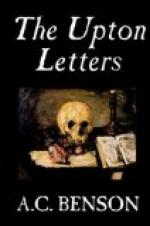Then, again, Henry James is an indubitably great writer; though you amused me once by saying that you felt you really had not time to read his later books. Well, for myself, I confess that his earlier books, such as Roderick Hudson and the Portrait of a Lady, are books that I recur to again and again. They are perfectly proportioned and admirably lucid. If they have a fault, and I do not readily admit it, it is that the characters are not quite full-blooded enough. Still, there is quite enough of what is called “virility” about in literature; and it is refreshing to find oneself in the company of people who preserve at all events the conventional decencies of life. But Henry James has in his later books taken a new departure; he is infinitely subtle and extraordinarily delicate; but he is obscure where he used to be lucid, and his characters now talk in so allusive and birdlike a way, hop so briskly from twig to twig, that one cannot keep the connection in one’s mind. He seems to be so afraid of anything that is obvious or plain-spoken, that his art conceals not art but nature. I declare that in his conversations I have not unfrequently to reckon back to see who has got the ball; then, too, those long, closely printed pages, such as one sees in The Wings of a Dove, without paragraphs, without breathing places, pages of minute and refined analysis—there is a high intellectual pleasure in reading them, but there is a mental strain as well. It is as though one wandered in tortuous passages, full of beautiful and curious things, without ever reaching the rooms of the house. What I want, in a work of imagination, is to step as simply as possible into the presence of an emotion, the white heat of a situation. With Henry James I do not feel certain what the situation is. At the same time his books are full of fine things; he has learnt a splendid use of metaphor, when the whole page seems, as it were, stained with some poetical thought, as though one had shut a fruit into the book, and its juice had tinted the whole of a page. But that is not sufficient; and I confess I close one of his later volumes in a condition of admiring mystification. I do not know what it has all been about; the characters have appeared, have nodded and smiled inscrutably, have let fall sentences which seem like sparkling fragments of remarks; I feel that there is a great conception behind, but I am still in the dark as to what it is.
There are two or three other authors whose books I read with interest. One of these is John Oliver Hobbes. Her books do not seem to me to be exactly natural; it is all of the nature of a scenic display. But there is abundance of nobility and even of passion; and the style is original, nervous, and full of fine aphorisms. There is a feeling of high and chivalrous courage about her characters; they breathe perhaps too lofty an air, and are, if anything, too true to themselves. But it is a dignified romance, rather mediaeval than modern, and penetrated with a pungent aromatic humour which has a quality of its own.




